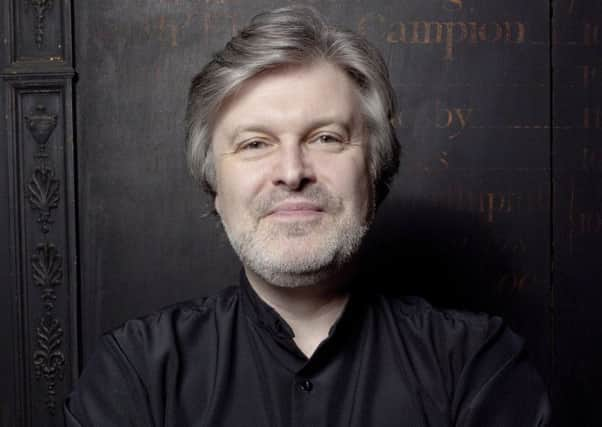Euan McColm: Art for art's sake doesn't seem to be good enough for the nats


Self-styled radicals cosied up with establishment figures like former first minister Alex Salmond without ever questioning his plans.
Now, of course, there was nothing unremarkable about artists taking a side in the constitutional argument, but the willingness of so many to act as mere propagandists for SNP ministers was troubling indeed.
Advertisement
Hide AdThe unseemly spectacle of creative Scots as government poodles reached its apotheosis when the writer Alan Bissett appeared at the SNP’s final conference before referendum day to perform a section of his pro-independence play, The Pure, The Dead And The Brilliant, in advance of Salmond’s keynote speech.
Bissett – whose simplistic “Scotland good, UK bad” view of the arguments then playing out made him a darling of the government and encouraged the funding of his work by Yes supporters – became something of a poster boy for state-approved art.
The referendum is old news but there still linger nagging doubts about the undue influence of the Scottish Government on the arts community.
The composer and conductor Sir James MacMillan is one of the few high-profile creative Scots willing to ask important questions about this uneasy relationship. Last week, in the aftermath of funding announcements by arts quango Creative Scotland, he ventured again into the debate.
MacMillan recalled how he and assorted others in the “creative community” (his exasperated inverted commas) were invited, last May, to an event where the matter of Scotland’s “National Culture Strategy” would be discussed.
Culture Secretary Fiona Hyslop reassured those attending that Scottish artists “don’t have to be close to government. They just have to have a common understanding of what the country wants.” This reassurance only served to underline the problem of government interference as well as exposing the Culture Secretary’s failure to understand the nature of artists and their work.
Advertisement
Hide AdArtists do not “have to” have a common understanding of anything. They are not part of a herd and those willing to be subsumed into one are not necessarily the free and original thinkers they might consider themselves.
MacMillan went on to describe an event where group discussions were led by nationalists such as former pop star Pat Kane. The “common understanding” of Scottishness and artists’ concerns over Brexit were hot topics.
Advertisement
Hide AdCreative Scotland was represented at the event, MacMillan reported, but so far as he could see, it was rather sidelined. The composer now asked whether the politician-led government strategy for the arts superseded that produced by Creative Scotland.
Last week’s Creative Scotland funding announcement saw a number of highly controversial decisions. Children’s theatre companies Catherine Wheels and Visible Fictions, and Birds of Paradise and Lung Ha, both of which work with people with learning disabilities, are among 20 organisations and companies to be completely stripped of their long-term funding.
It’s hardly surprising that questions exist about Scottish Government influence in these decisions. The Culture Secretary, having laid out ground rules about the duty of artists, can hardly expect us to accept that she has no desire to influence the direction in which publicly funded creative work moves, can she?
There are others who share MacMillan’s concerns but who feel unable to speak up over fears that their own funding will be cut. This is an intolerable situation.
Those “creatives” (my exasperated inverted commas) who aligned themselves with the SNP in 2014, believing themselves to be part of a socialist rather than a nationalist project, face a new quandary. Do they stick with the cautious party of Scottish government, with its generally centrist policies, or do they align themselves with the UK Labour Party under the leadership of old-school socialist, Jeremy Corbyn? If their desire truly is for a more traditionally left-wing direction for the country then surely the nats’ horse is the wrong one to back? As MacMillan wrote last week, “Much of what the SNP and Yes campaign offered creative types and intellectuals – grievance, moral superiority, a hint of radicalism – Corbyn’s Labour Party provides in spades”.
I share the composer’s confusion about the willingness of some artists to support a government which has done so little for them. When he states that the SNP at Holyrood is unwilling to trust the instincts of artists, preferring to pressure them into becoming part of its national project, I can’t help but agree.
Advertisement
Hide AdOf course, the usual pro-government bloggers and SNP hangers-on were utterly dismissive of MacMillan (after all, what on earth can the country’s pre-eminent composer know about the creative process?) but these dismissive reactions merely bolster his case. If one is the wrong kind of artist (ie not a grievance-driven nationalist) then one’s views are worthless.
Under the Labour-Liberal Democrat coalition that controlled Holyrood between 1999-2007, there was no attempt by ministers to dictate to artists what they should and should not do. This may not fit with the worldview of those in the arts world duped into thinking the Scottish Government is their great champion but it is, I’m afraid, the truth.
Advertisement
Hide AdHaving given themselves over to the cause of the party of government, will those pro-independence artists feel able to criticise the SNP when criticism is due? The signs, so far, are that they will not. The sense of moral superiority that accompanied the support of some artists for independence carries on. This is not a recipe for freedom of expression.
Artists should be able to expect the support of government when it comes to funding. But concerns endure that that support is conditional on those artists backing the SNP and its independence plans.